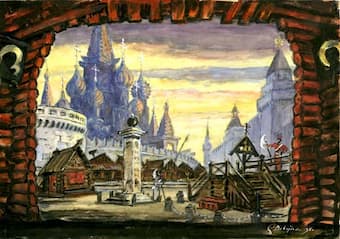It's all about the classical music composers and their works from the last 400 years and much more about music. Hier erfahren Sie alles über die klassischen Komponisten und ihre Meisterwerke der letzten vierhundert Jahre und vieles mehr über Klassische Musik.
Total Pageviews
Sunday, June 9, 2024
The Best of Mussorgsky
Tuesday, January 11, 2022
Time of Day: Dawn
Mussorgsky, Pigovat, Sviridov, Eller, Harris and Qin

Mstislav Dobujisky: Act I design for Khovanshchina, 1950 (Met Opera Archives)
How do you take the morning, musically? Bright and brassy alarm bells, a gentle reminder from the buzzer, the shock of morning radio? We decided to survey music for the earliest time of day: Dawn.
We’ll start with Mussorgsky’s music to open Act I of his opera Khovanschchina. The prelude is Dawn on the Moscow River, which was orchestrated by Rimsky-Korsakov following the piano version. The opera opens in Moscow at dawn and is a highly romantic tone painting, with Russian folk song sounds, the gradual brightening of the sky, the bells sounding in the horns. In the opera house, it’s a wonderful way of waking up the stage and starting the opera.
Russian-Israeli composer Boris Pigovat (b. 1953) wrote his dawn piece in 2010 for violist Anna Serova. Pigovat was inspired by the description of sunrise in ancient Greece, as described by Nikolaj Kun in 1914:
The morning is near… There is a faint light in the East. Aeos and Pyrios, the morning stars and harbingers of Dawn, shine brightly in the East. There is a gentle breeze. The light in the East glows brighter and brighter… In vivid colours, on rosy wings, Dawn is soaring into the illuminated sky, drenched in rosy light. Dawn pours dew from her golden urn onto the Earth, and the dew sprinkles the grass and flowers with glistening, diamond-like drops. All is fragrant, all around. The waking Earth happily greets the sun god, Helios. (Kun: Legendy i Mify Drevnej Gretsii (Legends and Myths of Ancient Greece, 1914))
Percussion and harp are the twinkling stars and the breeze is in the woodwinds’ notes. The viola invokes the colours of the morning.
